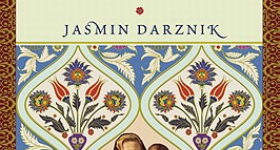“Further out beyond the reef, where the
coral gives way to the true deep, at a certain time of day, a tribe of silver
fish gather in their thousands. To be there is to be surrounded by living
shards of light. At a secret signal, all is chaos, a thousand mirrors
shattering about him.” These lines from the opening pages of
Nayomi Munaweera’s luminous debut novel Island of
a Thousand Mirrors contain the crucial arc of what will follow -- a chronicle of
a beautiful island and the civil war that devastates it, the stories of lives
and loves shattered before their true potential can be fulfilled, the holding
on to hope that the mirrors can, at some point in the future, be put back
together again.
The island country is Sri Lanka, the
narrator is Yasodhara, of Sinhalese origin, who as a young girl, along with her
parents and her sister Lanka, flees the riot-torn streets of Colombo to the
safety of California. The country they leave behind is about to be consumed by
a civil war -- between the Tamil Tigers in the north seeking to secede and the
ruling Sinhalese majority. Wielding a masterful authorial omniscience,
Yasodhara recounts her personal history, starting from the childhood of her
parents in a Sri Lanka freed from the yoke of the British in 1948, through the
riots in 1983 that forces her family to leave for an immigrant life in America,
to the culmination of the war more than two decades later. The novel is not an
account of the country’s history or the reasons for the civil
war, nor is it an attempt to place the blame on either of the warring factions
(the novel’s most heart-stopping episodes -- and
there are many of these: the loss in the riots of husband and child of a
beloved aunt, the rape of an innocent, the death of a sister -- reveal
perpetrators from both sides). The novel concentrates, instead, on the cycle of
inhumanity that an ethnically-motivated conflict unleashes in inhabitants of
the same land, and the humanity that struggles to survive the depredations. The
thread of Yasodhara’s narrative involves various loves
thwarted or destroyed: Yasodhara’s
mother’s love for her Tamil neighbor,
Yasodhara’s aunt’s
love for her husband, Yasodhara’s childhood love for her neighbor’s son (also a Tamil), the love between sisters,
the love of mothers for their children, and various episodes of unrequited or
spurned or lost love. The climactic violence that allows Yasodhara to be
reunited with her childhood love functions as a stand-in for the final act of
violence the country will live through, a haunting foreshadowing of the price
that will be paid before the sundered country is brought together again.

Nayomi Munaweera
Munaweera’s writing is everywhere remarkable: a concentrated
lyricism that is supple, and at the same time, muscular. Descriptions of places
and people, customs and sights and tastes and smells, come alive with
astonishing economy. Of Yasodhara’s
mother’s childhood, Munaweera writes, “When the sea breeze blows, a snowy flurry of
flowers seeps into the house so that Visaka’s
earliest and most tender memory is the combined scent of jasmine and sea salt.” Of the difference between Sri Lankan and
Californian oranges: “On the island they were meager green
orbs, sour and full of pips. Here oranges are a marvel, fat and bright as
sunlight, their juice sparkling, their skins falling away into swirls and
curls.” Of the single men who respond to
advertisements for Yasodhara’s arranged marriage: “So many lonely men dreaming in Sinhala, moaning in
their chilly beds, wanting American green cards and perfectly cooked eggplant
curry. So much palpable need, such archaeologies of desire that I am suddenly
afraid.” And Munaweera does not shy away from
depicting the gory details of violence, employing the same techniques of acute
observation and compression. Of the decapitated head of a victim of suicide
bombing, she writes: “Her eyes and mouth agape, hair
streaming down the steps and with it the various sinews and octopus strips of
flesh blown from her neck.” This boldness in approaching even the
grotesque with a clear eye, coupled with her ability to capture the essence of
an experience through striking imagery, stands Munaweera in good stead when it
comes to describing the main acts of violence that lie at the heart of the
novel. These are harrowing sections, and Munaweera gives them the weight they
deserve, without glossing over them, or sensationalizing them.
Towards the last third of the novel,
Munaweera falters a little through the abrupt introduction of a new voice: that
of Saraswathi, a girl of Tamil origin who will later join the Tigers. Though
these sections are powerful as written, one wonders if the book would have been
better served by adapting Yashodhara’s
audacious and empathetic omniscience (used to great effect in the earlier
sections of the novel to relate her parents’
experiences in Sri Lanka) to subsume Saraswathi’s
point of view as well (especially since Saraswathi’s voice is similar enough to Yasodhara’s, and her story while riveting, is less nuanced
and more predictable). Also, the events that bring the main actors together for
the climax feel more accidental than inevitable, and the reader is left
wondering if the essential randomness that characterizes tragedies in times of
conflict is one of Munaweera’s themes for the book. And what to
make of the failed loves that bring both Yasodhara and her sister Lanka back to
the island for the climax? Love as a concern, it seems, is for the privileged,
while the less fortunate have more pressing worries like survival, and keeping
body and soul together.
But these are minor complaints
compared to the book’s vast accomplishments. This is a
searing debut, as fearless as it is beautiful, introducing a writer who calls
out to be read. The book is already on its way, having been long-listed for the
Man Asian Literary Prize. No doubt, Nayomi Munaweera is a writer to watch out
for.
Nawaaz Ahmed is a transplant from Tamil Nadu, India. He holds a Ph.D. in Computer Science from Cornell University, and an MFA in Creative Writing from the University of Michigan, Ann Arbor, where he won Hopwood awards for his short stories, non-fiction, and his novel-in-progress.









Comments